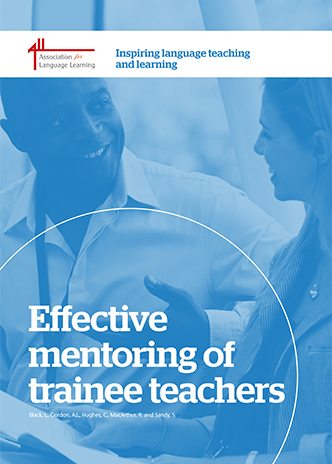Description
Effective mentoring of Modern Foreign Language (MFL) trainee teachers as they embark on their professional teaching journey is the topic of the second publication in ALL’s series ‘Inspiring language teaching and learning’.
Black, L., Gordon, A.L., Hughes, C., MacArthur, R. and Sandy, S.
It is a challenging time for MFL in schools and we read stories in the media almost every day – challenges of recruitment, issues around retention, impact of Brexit, to name but a few. Against this backdrop, it is more important than ever to inspire and nurture our MFL trainee teachers and NQTs. This publication is also timely in the context of the National Standards for school-based initial teacher training mentors (DfE, 2016) with their clear focus on the pivotal role played by mentors in all phases and across all curriculum areas. As a modern foreign languages (MFL) community, we have a shared responsibility to inspire and nurture the next generation of teachers so that they, in turn, will enthuse the next generation of language learners in schools.
There have been significant changes to the routes for initial teacher training (ITT) in recent years and this publication is intended for anyone involved – directly or indirectly – with mentoring a MFL trainee during their initial training period, whatever the training route. Many chapters in this publication are also relevant for colleagues who are supporting a newly qualified teacher (NQT) or perhaps a teacher returning to the profession. Although written with the secondary school context in mind, many of the approaches and ideas are useful for a primary school mentor who is nurturing a trainee for MFL teaching.
The aim of this publication is to support you in your work as a MFL mentor by providing practical guidance to carry out your role effectively. The overriding emphasis throughout must be on how your contribution as the MFL mentor benefits the professional development of your trainee teacher and, in turn, other MFL colleagues and pupils in your school.
About the Authors
Liz Black taught languages in a range of schools and has mentored trainee teachers throughout her career. She worked as a head of department and Advanced Skills Teacher for many years. She is currently the MFL PGCE leader at the University of York. She has experience of mentoring both primary and secondary trainees on a number of the different routes into teaching.
Anna Lise Gordon has mentored a number of trainees and worked as a professional coordinating mentor in schools. Her current role as MFL PGCE tutor at St Mary’s University has involved working with more than 200 trainees and colleagues in their placement schools. She actively promotes the work of new teachers through ALL.
Carol Hughes has worked with both school-centred training schemes (SCITT), graduate teacher programmes (GTP) and university programmes, whilst carrying out teaching roles in schools. She has also been subject lead for MFL and held a professional mentor role, which involved monitoring the training of trainees in a number of different subjects.
Rachel MacArthur has taught in a variety of inner city schools across the country supporting and mentoring trainee languages teachers. She now works as an MFL Consultant for the Harris Federation, a role which enables her to still be rooted in the classroom but also support and train MFL colleagues from beginner teachers through to heads of department. The Federation has its own SCITT, for which she is the Spanish subject specialist.
Stephanie Sandy is an experienced mentor who has nurtured trainees in two different school contexts, including both PGCE and school-based routes. Her commitment to initial teacher training (ITT) has led to her current role as a new MFL PGCE tutor at St Mary’s University.




